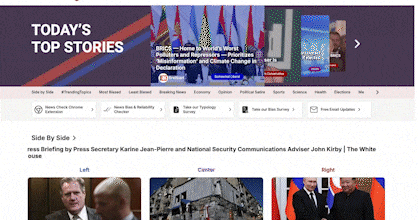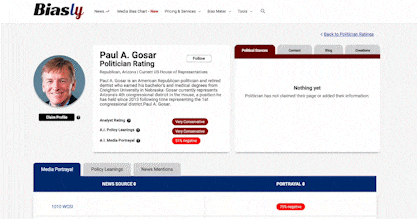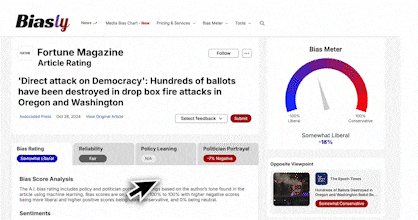Iran's advances spur debate in Israel on "nuclear ambiguity" policy
- Bias Rating
-56% Medium Liberal
- Reliability
N/AN/A
- Policy Leaning
70% Medium Conservative
- Politician Portrayal
-55% Negative
Continue For Free
Create your free account to see the in-depth bias analytics and more.
Continue
Continue
By creating an account, you agree to our Terms and Privacy Policy, and subscribe to email updates. Already a member: Log inBias Score Analysis
The A.I. bias rating includes policy and politician portrayal leanings based on the author’s tone found in the article using machine learning. Bias scores are on a scale of -100% to 100% with higher negative scores being more liberal and higher positive scores being more conservative, and 0% being neutral.
Sentiments
N/A
- Conservative
| Sentence | Sentiment | Bias |
|---|---|---|
Unlock this feature by upgrading to the Pro plan. | ||
Reliability Score Analysis
Policy Leaning Analysis
Politician Portrayal Analysis
Bias Meter
Extremely
Liberal
Very
Liberal
Moderately
Liberal
Somewhat Liberal
Center
Somewhat Conservative
Moderately
Conservative
Very
Conservative
Extremely
Conservative
-100%
Liberal
100%
Conservative

Contributing sentiments towards policy:
48% : What's next: Israeli national security adviser Eyal Hulata will travel to Washington next week for talks on Iran with his White House counterpart Jake Sullivan.45% : He thinks that Iran is indeed very close to that point, but that there is still time, and if Israel acts on its own and with its allies in a systematic way, it is still possible to stop them."
40% : What they're saying: Former Israeli Prime Minister Ehud Barak wrote in the Yedioth Ahronoth newspaper that Iran had "probably crossed the point of no return," and he hinted that Israel should review the nuclear ambiguity policy.
38% : State of play: The indirect talks between the U.S. and Iran to salvage the 2015 nuclear deal are still frozen, and the International Atomic Energy Agency accused Tehran on Sunday of violating a deal to allow inspectors to install new surveillance cameras at a key nuclear site.
36% : But a new report is sparking an unprecedented public debate among politicians and experts about whether Israel's nuclear posture needs to change to deter Iran.
*Our bias meter rating uses data science including sentiment analysis, machine learning and our proprietary algorithm for determining biases in news articles. Bias scores are on a scale of -100% to 100% with higher negative scores being more liberal and higher positive scores being more conservative, and 0% being neutral. The rating is an independent analysis and is not affiliated nor sponsored by the news source or any other organization.

























 Axios
Axios


